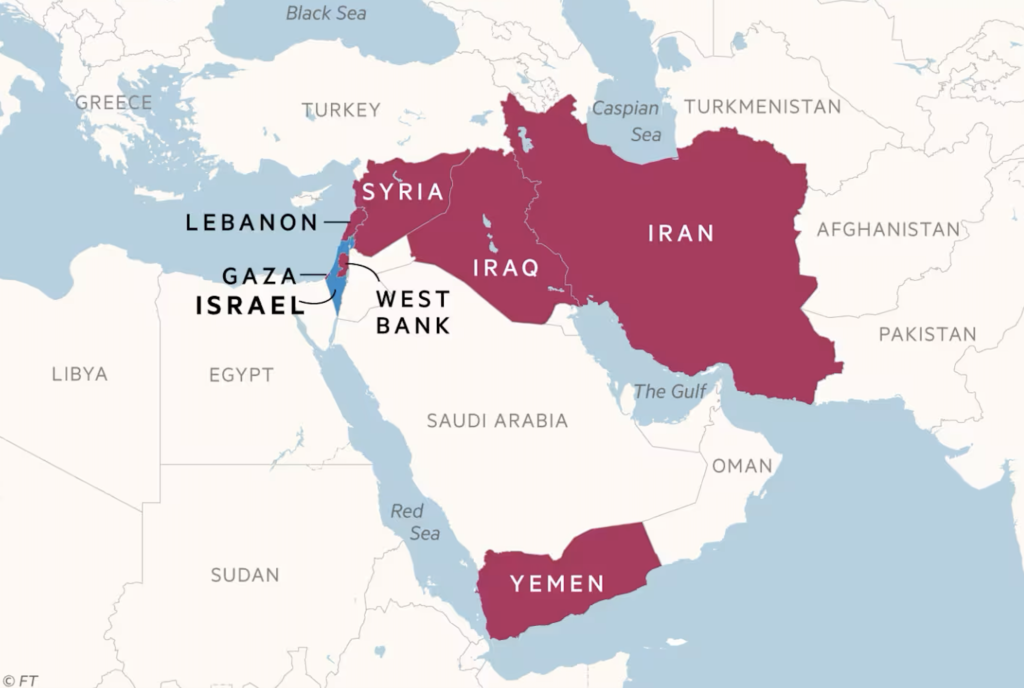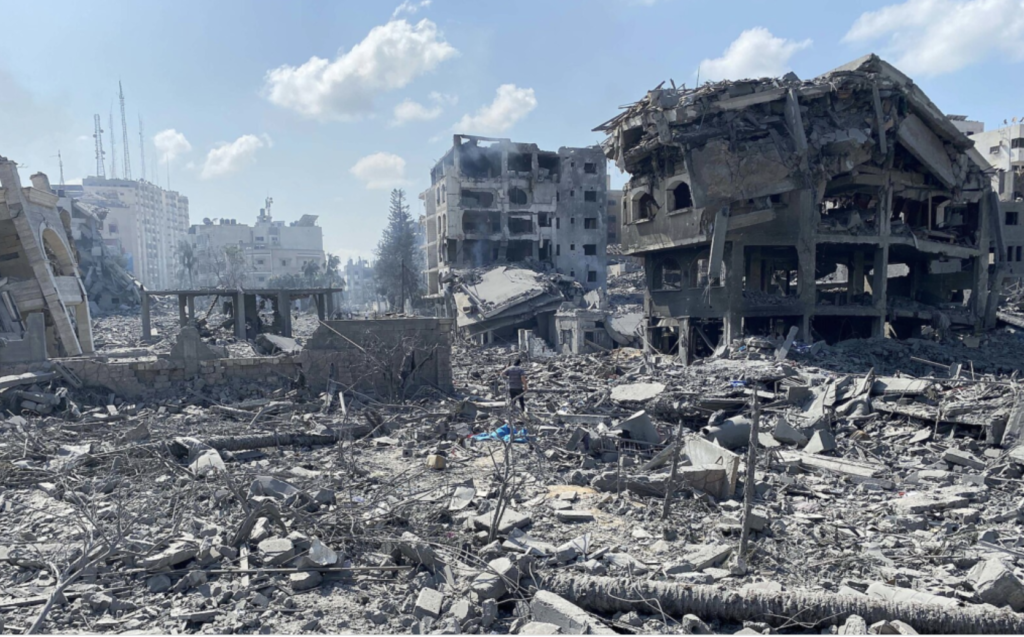Israel’s War on Gaza May Lead to a Regional Conflagration

By: Ghassan Rubiez / Arab America Contributing Writer
Israel’s constantly shifting war tactics reflect miscalculation and poor planning. Finding itself in a deep hole, Israel digs deeper.
In the ongoing Gaza war, Israel has been severely maltreating the people of Gaza, failing to prioritize the freeing of hostages held by Hamas and oblivious to the admonitions of an indulgent, supportive US administration. This approach has rendered Gaza unlivable, slowed the freeing of captives, and forced the US into a diplomatic corner.
In response to the October 7 attack, Israel declared war on Hamas. Instantly, Netanyahu made it clear that he would swiftly and decisively eliminate the leading Palestinian resistance and free the 240 hostages.
In dealing with the people of Gaza, Israel has changed its policy four times. In managing the fate of hostages it shifted its approach three times. And in dealing with the US it listened but largely ignored the message.
Treatment of the People of Gaza

Initially, Israel declared that it was eager to protect Gazans from Hamas by eliminating the leaders and infrastructure of this “unpopular” militia. Israel’s officials claimed that most Palestinians would be glad to see Hamas liquidated. This purported “protection phase” lasted a week. On the seventh day of the war, Israel started elevating the level of maltreatment of Gazans. With a mindset of cattle-herding, the Israel Defence Forces ordered over one million people, who live in the north of Gaza, to pack their belongings immediately and move to the southern half of the Strip. Israel had not informed the US of this sudden, cruel, and hard-to-execute order.
Naturally, it was not possible to displace a large segment of the population safely, in a few days, and under war conditions. As the war fatalities piled up, the message changed again to make the victim responsible for its demise. The people of Gaza were told that they were suffering collateral damage for hosting Hamas fighters. It is as if there were enough space, in a very densely populated area, for some 40 000 fighters to live or fight away from their people.
As Israel failed to defeat Hamas fighters, it shifted to a third policy phase. Israel started covert discussions for the evacuation of Gazans into Egypt (or to any other Arab or African country) in order to facilitate the termination of Hamas. The people of Gaza refused to be displaced across borders. We are now in a new policy phase: making life unlivable for the residents of Gaza. This is the start of an ethnic cleansing phase.
In three months, Israel has shifted its policy from protection to internal displacement to (attempted) external displacement, to an indirect form of ethnic cleansing. We do not know what will come next.
Dealing with Hostages

Just as Israel rationalized its misguided policy vis-a-vis the people of Gaza, it rationalized its erratic plans for the hostages. At the start of the war, Israel let the entire world know that there would be no negotiation with the enemy, Hamas. Israel gave the impression to the families of the hostages that it was simultaneously capable of freeing their loved ones and destroying Hamas. This promise was broken in a few weeks. Between the 22 and 30 November, 105 hostages were exchanged for 300 Palestinian prisoners during two rounds of negotiations. About 135 hostages remain in captivity.
Negotiations for additional release of hostages terminated abruptly. As fighting continued, the dual goal of freeing hostages and fighting the enemy started to sound contradictory. Instead of relaxing its terms for ending the hostage crisis, the IDF decided to tighten the pressure on Hamas to free the hostages. The result was more killing of civilians and more destruction of Gaza.
The pressure on Israel to accept a ceasefire is mounting from the side of the families of the remaining hostages and the international community. Israel has so far resisted these two important sources of pressure. The IDF claims that it is now shifting from wide-scale air bombing to a more focused ground fighting which would supposedly minimize harm to civilians and force Hamas to free the hostages. Neither the families of the hostages nor the international community is convinced that continuing the fighting will enhance the chances of liberation or survival of the hostages.
Meanwhile, Israel remains oblivious to the human cost and economic impact of its war on the people of Gaza. Israel’s policy toward the hostages has shifted in different ways. The shift has been from opposition to negotiation with Hamas to indirect negotiation. Last week revived negotiations halted when Israel assassinated an important Hamas leader in Lebanon. This week, the shift in fighting was from the northern part of Gaza to its central and southern parts.
US Worries about a Regional War, Israel’s Resistance to US Pressure

President Biden has been providing Israel with support in every possible way. However, the US administration is aware that the war in Gaza could spill over to Lebanon and easily expand to a regional conflict. The carnage has become too provocative for the Arab world, particularly for Hezbollah in Lebanon, the Houthi forces in Yemen, and the anti-Western Iraqi militias.
Moreover, the borders of Israel with Lebanon have recently become the most explosive area in the region. The IDF is under pressure to return home the 70,000 border town residents who were evacuated to safer zones after October 7. About the same number of Lebanese border town residents were evacuated in the other direction. The IDF has threatened to launch a new war on Lebanon to defeat Hezbollah and create a “security buffer zone” along the Lebanese border. We have been in this situation before where security is claimed through the occupation of enemy territory: Israel’s 22-year occupation of south Lebanon from 1978 to 2000. Hezbollah would not take this threat lightly. The exchange of fire between Hezbollah and the IDF has intensified over the weekend. Israel’s assassinating today (1/8/23) of Wissam al-Tawil, a senior Hezbollah commander, fuels the fears of an all-out war.
We seem to be at a crossroad: a new regional war or a US-mediated diplomatic solution for a highly contested border. White House advisor Amos Hochstein is presently trying to help delineate the disputed land borders of the two counties; he successfully mediated the delineation of the maritime borders in 2022. But mediating the separation and calming of two proud and tense armies may prove to be too complicated for Hochstein.
Despite his popularity in Israel, Biden has been very frustrated in containing Israel’s intransigence. He displays weakness as he keeps expressing concern about US interests, the stability of the region, and Israel’s future security, without taking bold steps toward desired goals.
Israel enjoys a unique status in America. Unconditionally supported by the Congress, Israel’s war cabinet feels strong enough to resist pressure from the White House. However, polling shows Americans are broadly unhappy with Biden’s response to the war, including a notable erosion in support among key parts of the Democratic coalition, particularly young people.
Israel is aware that Biden needs the Jewish community in his presidential campaign, to win a second term. So far, Netanyahu has been able to receive aid unconditionally and stay on course for what he wants to do in Gaza and what he dreams of doing in Lebanon.
As Gaza is becoming unlivable, the safety of hostages looking questionable and the patience of the international community runs out, both Israel and the US have become diplomatically isolated.
Washington knows well that the rush to war to solve political problems is counterproductive and demoralizing. It is urgent to open realistic channels for peace and justice among Israel, Lebanon, and the Palestinians. Will Tel Aviv listen?
About the author: Ghassan Rubeiz is the former Middle East Secretary of the World Council of Churches. Earlier he taught psychology and social work in his country of birth, Lebanon, and later in the United States, where he currently lives. For the past twenty years, he has contributed to political commentary and delivered occasional public talks on subjects related to peace, justice, and interfaith. You can reach him at rubeizg@gmail.com
The views and opinions expressed in this article are those of the author and do not necessarily reflect the position of Arab America. The reproduction of this article is permissible with proper credit to Arab America and the author.
Check out Arab America’s blog here!









